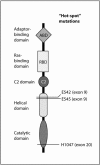The phosphoinositide 3-kinase pathway in human cancer: genetic alterations and therapeutic implications
- PMID: 19384426
- PMCID: PMC2652403
- DOI: 10.2174/138920207782446160
The phosphoinositide 3-kinase pathway in human cancer: genetic alterations and therapeutic implications
Abstract
The phosphoinositide 3-kinase (PI3K) pathway is frequently activated in human cancer and represents an attractive target for therapies based on small molecule inhibitors. PI3K isoforms play an essential role in the signal transduction events activated by cell surface receptors including receptor tyrosine kinases (RTKs) and G-protein-coupled receptors (GPCRs). There are eight known PI3K isoforms in humans, which have been subdivided into three classes (I-III). Therefore PI3Ks show considerable diversity and it remains unclear which kinases in this family should be targeted in cancer. The class I(A) of PI3K comprises the p110alpha, p110beta and p110delta isoforms, which associate with activated RTKs. In human cancer, recent reports have described activating mutations in the PIK3CA gene encoding p110alpha, and inactivating mutations in the phosphatase and tensin homologue (PTEN) gene, a tumour suppressor and antagonist of the PI3K pathway. The PIK3CA mutations described in cancer constitutively activate p110alpha and, when expressed in cells drive oncogenic transformation. Moreover, these mutations cause the constitutive activation of downstream signaling molecules such as Akt/protein kinase B (PKB), mammalian target of rapamycin (mTOR) and ribosomal protein S6 kinase (S6K) that is commonly observed in cancer cells. In addition to p110alpha, the other isoforms of the PI3K family may also play a role in human cancer, although their individual functions remain to be precisely identified. In this review we will discuss the evidence implicating individual PI3K isoforms in human cancer and their potential as drug targets in this context.
Figures


References
-
- Engelman JA, Luo J, Cantley LC. The evolution of phosphatidylinositol 3-kinases as regulators of growth and metabolism. Nat. Rev. Genet. 2006;7:606–19. - PubMed
-
- Shaw RJ, Cantley LC. Ras PI(3)K and mTOR signalling controls tumour cell growth. Nature. 2006;441:424–30. - PubMed
-
- Workman P, Clarke PA, Guillard S, Raynaud FI. Drugging the PI3 kinome. Nat. Biotechnol. 2006;24:794–6. - PubMed
-
- Vogt PK, Kang S, Elsliger MA, Gymnopoulos M. Cancer-specific mutations in phosphatidylinositol 3-kinase. Trends Biochem. Sci. 2007;32:342–9. - PubMed
LinkOut - more resources
Full Text Sources
Other Literature Sources
Research Materials
Miscellaneous
